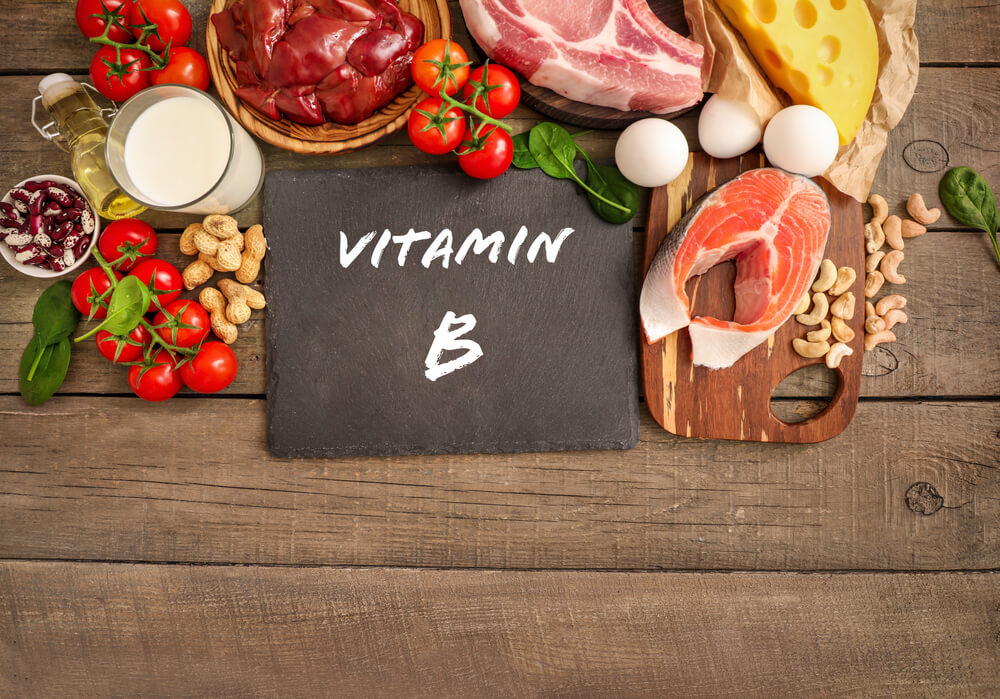If you have recently begun to notice absent-mindedness, mood swings, increased irritability, muscle weakness, and fatigue, it’s time to pay attention to the deficiency of B vitamins. According to statistics, a deficiency of B vitamins is found in approximately 60% of the inhabitants of Russia. At risk are people who are subject to constant stress, older people, as well as those who have bad habits.
Women of reproductive age who are planning a pregnancy or are already in an interesting position deserve special attention. After all, folic acid (vitamin B9) helps to avoid birth defects in a child.
We offer today to dwell in more detail on each vitamin of this important group and analyze products that will avoid their deficiencies. The most studied vitamins are thiamine (B1), riboflavin (B2), niacin (B3), pantothenic acid (B5), pyridoxine (B6), biotin (B7), folate (folic acid, B9) and cobalamin (B12). ). In this review, we would like to focus your attention on them.
What are the B vitamins for?
Vitamin B1 (thiamine) – this vitamin not only supports the functioning of the nervous system but also nourishes the muscles, and participates in the breakdown of carbohydrates. Its sources are:
- cereals,
- meat (pork),
- by-products (liver),
- seafood,
- nuts (peanuts),
- berries,
- yeast.
Most often, thiamine deficiency occurs with strict diets, as well as in patients with congestive heart failure taking loop diuretics, with inflammatory bowel diseases.
Vitamin B2 (riboflavin) supports digestion, vision and mucous membrane function, and skin beauty. Participates in hematopoiesis and energy production from carbohydrates. In individuals with a genetic predisposition to high blood pressure, riboflavin supplementation has been shown to lower blood pressure levels 1 . Riboflavin sources are:
- cereals,
- dairy,
- Brewer’s yeast,
- poultry meat,
- eggs.
You can suspect a lack of this vitamin in yourself if you begin to notice cracks in the corners of your mouth, ulcerative elements in the oral cavity, and increased sensitivity to light.
Vitamin B 3 (niacin) normalizes the functioning of the stomach and pancreas, has oncoprotective properties, is part of the enzymes that provide cellular respiration, and supports the functioning of the nervous and cardiovascular systems. At high doses, niacin lowers bad cholesterol (LDL) and high triglycerides (TG), while raising good cholesterol (HDL) 2. Vitamin B3 has also been shown to have a positive effect on neuroinflammation in people with Parkinson’s disease 3. Sources:
- Brewer’s yeast,
- seafood,
- poultry, pork,
- vegetables (broccoli, potatoes, carrots),
- cereals,
- peanut,
- with sunflower seeds.
Cells can make their niacin from the amino acid tryptophan, provided it is adequately supplied in the diet.
Deficiencies are manifested in the form of skin lesions (like pellagra), disorders of the gastrointestinal tract, and a tendency to depression.
Vitamin B 5 (pantothenic acid) is involved in the production of energy at the cellular level, helps to activate the processes of releasing fats from the depot, and as part of coenzyme A plays an important role in the oxidation and biosynthesis of fatty acids, sterols, and phospholipids. In addition, pantothenic acid stimulates the formation of glucocorticoids by the adrenal glands and improves the structure of the skin, hair, and nails.
Insufficiency of vitamin B 5 is indicated by fatigue, weakness, and apathy, in extreme cases, numbness of the extremities is possible. Fill the deficit will help:
- cereals,
- offal (beef liver, kidneys),
- sea fish,
- dairy,
- fresh vegetables,
- legumes,
- nuts.
Vitamin B 6 (pyridoxine) has an important effect on many links of metabolism and supports the functioning of the nervous and immune systems. Mild deficiency is difficult to detect, as it has practically no clinical manifestations. With a pronounced deficiency, there is a weakening of the immune system, depression, loss of taste, confusion, and convulsions.
Sources of vitamin B6 are:
- poultry meat,
- soy,
- legumes (beans),
- nuts (walnut),
- yeast,
- fish (tuna, mackerel),
- berries (sea buckthorn).
Vitamin B7 (biotin) – this vitamin is well known to the beauty all over the world because missing its deficiency is equivalent to a crime forgiving one’s beauty: thinned dull hair, brittle nails, skin rash, depression 4.
Another important function of biotin is its participation in the production of myelin, a protective substance that surrounds the axons of nerve cells (the so-called nervous system wires). Unfortunately, biotin deficiencies often occur after long courses of antibiotics, because the main source of its production is the bacteria in our intestines.
In food, it is present in:
- eggs,
- vegetables (beets, cabbage, spinach),
- legumes,
- fruit,
- mushrooms,
- by-products (kidneys, liver),
- cheers,
- milk.
Vitamin B 9 (folate, folic acid) is a vitamin that is very important for the full development of all types of tissues. No pregnancy is complete without folic acid. After all, a decrease in the level of folates in the body of a pregnant woman can lead to serious fetal pathology – neural tube defects: spinal fusion, spinal cord structure splitting, brain herniation, pathology of the skull bones, and, of course, without timely compensation – intrauterine fetal death. Folate reduces the risk of having children with autism spectrum disorders 5.
With a folic deficiency, megaloblastic anemia, growth retardation is observed, hearing loss is noted in the elderly 6, renewal of the mucous membranes of the small intestine is disturbed, leukopenia, and the synthesis of important amino acids – glycine, methionine; wounds heal more slowly.
Sources of folate are:
- leafy vegetables,
- legumes,
- broccoli,
- avocado,
- nuts (almonds, peanuts),
- eggs.
Vitamin B 12 (cobalamin ), as well as biotin, plays an important role in the synthesis of myelin – the protection and support of nerve cells, serves as a cofactor in the synthesis of DNA – the genetic material of cells, participates in the formation of red blood cells, supports the male function of childbearing (spermatogenesis).
Cobalamin deficiency provokes anemia, reduced fertility, irreversible damage to nerve fibers, night cramps, skin diseases (eczema, vitiligo, atopic dermatitis), and hyperpigmentation 6,7,8.
B12 is found in animal products (mainly beef), offal (liver and kidney), seafood and fish, eggs, dairy products, and yeast.
Unfortunately, the most vulnerable group, which is more likely to be deficient in this vitamin, are vegetarians with a low intake of animal foods and the elderly with intestinal diseases.
Increased fatigue, irritability, weakness, disruption of the gastrointestinal tract, and tingling in the arms and legs – all of these can serve as the first triggers for the necessary timely compensation.
Which B Vitamin Supplements Should You Choose?
The benefits of individual vitamins increase when they interact. For example, the combination of B6, B9, and B12 helps to reduce elevated levels of homocysteine 9, which is a high-risk factor for the development of cardiovascular disease.
B – vitamin combinations slow down memory decline 10, have positive effects on brain function in Alzheimer’s patients 11, and improve cognitive function in people with dementia 12.
In turn, deficiency of B3, B6, and B12 contributes to the development of depression 13,14, especially in the elderly. Unfortunately, soil resources are currently depleted, and to be sure of getting all the important vitamins, experts recommend additional intake of vitamins in the form of dietary supplements.
Some people are afraid to take vitamins in the form of dietary supplements because they are worried about the risks of hypervitaminosis. However, all representatives of the B-complex are water-soluble vitamins, therefore, they do not accumulate in the body and are quickly excreted from it.
What dietary supplements with B vitamins to choose? I recommend paying attention to complexes in the form of effervescent vitamins from Evalar. The preparation contains 8 vitamins of group B, vitamin C and an important mineral – zinc.

